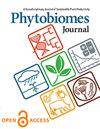Rapid restructuring of rhizosphere and endospheric fungal communities with drought in multiple lines of domesticated sunflower
IF 2.6
3区 生物学
Q2 MICROBIOLOGY
引用次数: 0
Abstract
Plant-associated mycobiomes can influence important host plant traits including those related to disease, nutrient acquisition, phenology, stress tolerance, and productivity. Disentangling the complex multifaceted relationships between host plants and their associated mycobiomes is a critical first step for generating improvements in environmental sustainability and/or plant productivity. Despite decades of work on these plant-fungal interactions, consequences of and mechanisms controlling these interactions are not well resolved, especially in the face of environmental stress such as drought. Moreover, plant differential genotypic responses under stress and associated mycobiome assembly dynamics are likely important in structuring communities but have been less well-studied. We conducted a controlled drought stress experiment by manipulating water treatment in a diverse set of cultivated sunflower lines with different inherent drought resistance levels to evaluate how sunflower host genotypes and drought interacts to affect belowground fungal mycobiomes at the rhizospheric and endospheric levels. Our results demonstrated that fungal community structure was driven by watering treatment, plant genotype, treatment by genotype interactions, genotype by plant compartment interactions and treatment by genotype by compartment interactions. Additionally, our analyses demonstrated the relative abundance of plant pathogens and arbuscular mycorrhizal fungi increased with host genetic variation, or heterozygosity, levels. Our study provides evidence for drought and genotypic drivers of belowground sunflower-fungi interactions and offers a framework for leveraging these interactions to further understand how mycobiome community structure can improve plant productivity under stress.多系驯化向日葵根际和内层真菌群落在干旱条件下的快速重组
植物相关真菌群落可以影响重要的寄主植物性状,包括与疾病、营养获取、物候、抗逆性和生产力相关的性状。解开寄主植物与其相关真菌群落之间复杂的多方面关系是改善环境可持续性和/或植物生产力的关键第一步。尽管对这些植物-真菌相互作用进行了数十年的研究,但控制这些相互作用的后果和机制尚未得到很好的解决,特别是在面对干旱等环境胁迫时。此外,植物在逆境下的差异基因型反应和相关的真菌组组装动态可能在构建群落中很重要,但研究较少。为了研究向日葵寄主基因型和干旱相互作用对根际和内圈地下真菌群落的影响,我们在不同抗旱性的向日葵栽培品系中进行了对照干旱胁迫试验。结果表明,真菌群落结构受浇水处理、植物基因型、基因型相互作用、植物室相互作用和基因型相互作用的影响。此外,我们的分析表明,植物病原体和丛枝菌根真菌的相对丰度随着宿主遗传变异或杂合程度的增加而增加。我们的研究为地下向日葵-真菌相互作用的干旱和基因型驱动因素提供了证据,并为利用这些相互作用进一步了解真菌群落结构如何在逆境下提高植物生产力提供了一个框架。
本文章由计算机程序翻译,如有差异,请以英文原文为准。
求助全文
约1分钟内获得全文
求助全文

 求助内容:
求助内容: 应助结果提醒方式:
应助结果提醒方式:


